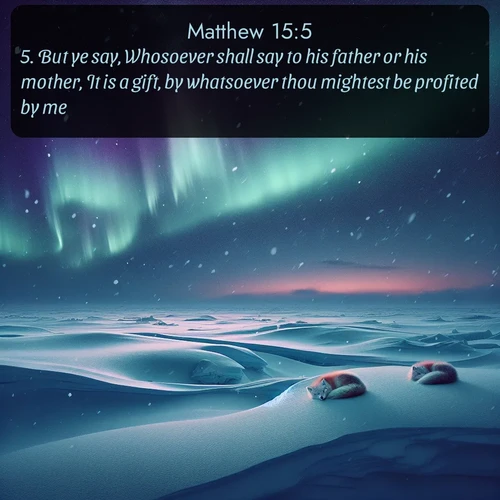Gospel of Matthew 15:5 plusieurs versions / traductions
English Bible Translations
5. But ye say, Whosoever shall say to his father or his mother, It is a gift, by whatsoever thou mightest be profited by me;
5. But ye say, whosoever shall say to his father or his mother, That wherewith thou mightest have been profited by me is given [to God];
5. But you say, If a man says to his father or his mother, That by which you might have had profit from me is given to God;
5. But *ye* say, Whosoever shall say to his father or mother, It is a gift, whatsoever [it be] by which [received] from me thou wouldest be profited:
5. But ye say, Whoever shall say to his father or his mother, It is a gift, by whatever thou mightest be profited by me;
5. but ye say, Whoever may say to father or mother, An offering [is] whatever thou mayest be profited by me; --
German Bible Translations
5. Ihr aber lehret: Wer zum Vater oder Mutter spricht: "Es ist Gott gegeben, was dir sollte von mir zu Nutz kommen", der tut wohl.
5. Ihr aber sagt: Wer zum Vater oder zur Mutter spricht: Ich habe zum Opfer vergabt, was dir von mir zugute kommen sollte; der braucht seinen Vater und seine Mutter nicht mehr zu ehren.
French Bible Translations
5. Mais d'après vous, celui qui dira à son père ou à sa mère: 'Ce dont j'aurais pu t'assister est une offrande à Dieu'
5. Mais vous, vous dites: Celui qui dira à son père ou à sa mère: Ce dont j’aurais pu t’assister est une offrande à Dieu, n’est pas tenu d’honorer son père ou sa mère.
5. Mais vous, vous dites: Celui qui dira à son père ou à sa mère: Ce dont j'aurais pu t'assister est une offrande à Dieu,
5. mais vous, vous dites: Quiconque dira à son père ou à sa mère: Tout ce dont tu pourrais tirer profit de ma part est un don,
5. Mais vous dites : quiconque aura dit à son père ou à sa mère : [Tout] don qui [sera offert] de par moi, sera à ton profit;
5. Mais vous, vous dites: Celui qui aura dit à son père ou à sa mère: Ce dont je pourrais t'assister est un don consacré à Dieu, n'est pas tenu d'honorer son père ou sa mère.
Versions with Strong Codes
Matthew 15 / KJV_Strong5.
Strong Code definitions
G1161 de/deh a primary particle (adversative or continuative); but, and, etc.:--also, and, but, moreover, now (often unexpressed in English).
G5210 humeis/hoo-mice' irregular plural of G4771; you (as subjective of verb):--ye (yourselves), you. see G4771
G3004 lego/leg'-o a primary verb; properly, to "lay" forth, i.e. (figuratively) relate (in words (usually of systematic or set discourse; whereas G2036 and 5346 generally refer to an individual expression or speech respectively; while 4483 is properly to break silence merely, and 2980 means an extended or random harangue)); by implication, to mean:--ask, bid, boast, call, describe, give out, name, put forth, say(-ing, on), shew, speak, tell, utter. see G2036 see G5346 see G4483 see G2980
G3739 hos/hos, including feminine ho ho probably a primary word (or perhaps a form of the article 3588); the relatively (sometimes demonstrative) pronoun, who, which, what, that:-one, (an-, the) other, some, that, what, which, who(m, -se), etc. See also 3757. see G3588 see G3757
G302 an/an a primary particle, denoting a supposition, wish, possibility or uncertainty:-- (what-, where-, wither-, who-)soever. Usually unexpressed except by the subjunctive or potential mood. Also contracted for G1437. see G1437
G2036 epo/ep'-o a primary verb (used only in the definite past tense, the others being borrowed from G2046, 4483, and 5346); to speak or say (by word or writing):--answer, bid, bring word, call, command, grant, say (on), speak, tell. Compare 3004. see G2046 see G4483 see G5346 see G3004
G3962 pater/pat-ayr' apparently a primary word; a "father" (literally or figuratively, near or more remote):--father, parent.
G2228 e/ay a primary particle of distinction between two connected terms; disjunctive, or; comparative, than:--and, but (either), (n-)either, except it be, (n-)or (else), rather, save, than, that, what, yea. Often used in connection with other particles. Compare especially 2235, 2260, 2273. see G2235 see G2260 see G2273
G3384 meter/may'-tare apparently a primary word; a "mother" (literally or figuratively, immediate or remote):--mother.
G1435 doron/do'-ron a present; specially, a sacrifice:--gift, offering.
G3739 hos/hos, including feminine ho ho probably a primary word (or perhaps a form of the article 3588); the relatively (sometimes demonstrative) pronoun, who, which, what, that:-one, (an-, the) other, some, that, what, which, who(m, -se), etc. See also 3757. see G3588 see G3757
G1437 ean/eh-an' from G1487 and 302; a conditional particle; in case that, provided, etc.; often used in connection with other particles to denote indefiniteness or uncertainty:--before, but, except, (and) if, (if) so, (what-, whither-)soever, though, when (-soever), whether (or), to whom, (who-)so(-ever). See 3361. see G1487 see G302 see G3361
G5623 opheleo/o-fel-eh'-o from the same as G5622; to be useful, i.e. to benefit:--advantage, better, prevail, profit. see G5622
G1537 ek/ek a primary preposition denoting origin (the point whence action or motion proceeds), from, out (of place, time, or cause; literal or figurative; direct or remote):--after, among, X are, at, betwixt(-yond), by (the means of), exceedingly, (+ abundantly above), for(- th), from (among, forth, up), + grudgingly, + heartily, X heavenly, X hereby, + very highly, in, ...ly, (because, by reason) of, off (from), on, out among (from, of), over, since, X thenceforth, through, X unto, X vehemently, with(-out). Often used in composition, with the same general import; often of completion.
G1700 emou/em-oo' a prolonged form of G3449; of me:--me, mine, my. see G3449
Prédications qui analysent les thèmes Évangile selon Matthieu 15
Thèmes : Traditions des ancêtres ; Nourriture spirituelleRelated Sermons discussing Gospel of Matthew 15
Themes : Traditions des ancêtres ; Nourriture spirituellesee also: Bible Key Verses ; KJV Bible Images, BBE Bible images

